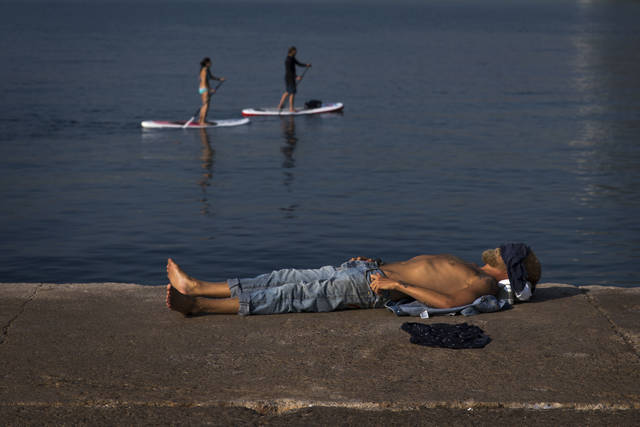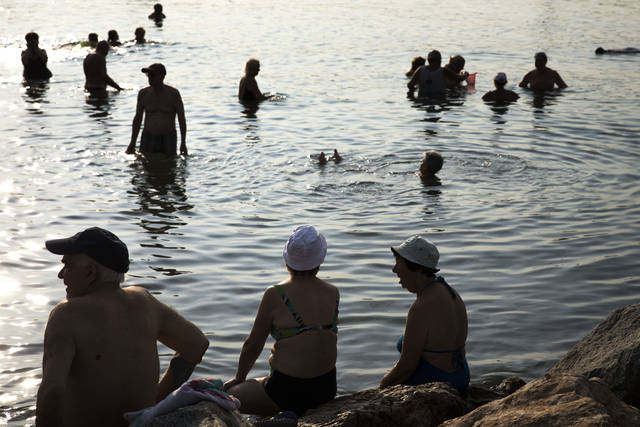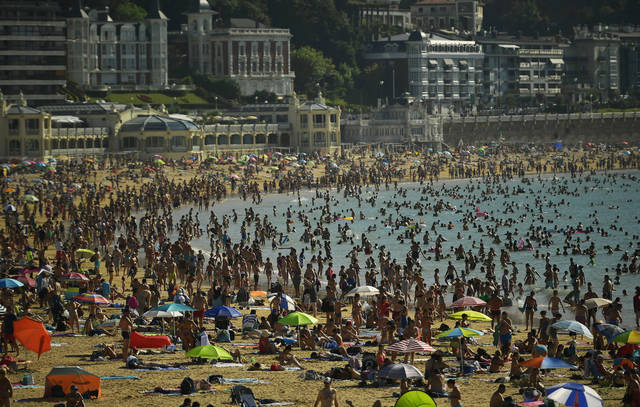Portugal and Spain issue red health alerts for extreme heat wave

ASSOCIATED PRESS
A man rests next to the beach during a hot summer day in Barcelona, Spain. Hot air from Africa is bringing a heat wave to Europe, prompting health warnings about Sahara Desert dust and exceptionally high temperatures that could peak at 47 degrees Celsius (117 Fahrenheit) in Spain and Portugal.

ASSOCIATED PRESS
People refresh themselves on the beach during a hot summer day in Barcelona, Spain. Hot air from Africa is bringing a heat wave to Europe, prompting health warnings about Sahara Desert dust and exceptionally high temperatures that could peak at 47 degrees Celsius (117 Fahrenheit) in Spain and Portugal.

ASSOCIATED PRESS
A woman takes a photo as her child plays in a fountain at a park in Moscow, Russia. The hot weather in Moscow is continuing, with temperatures forecast to reach 30 degrees Celsius (86 Fahrenheit).

ASSOCIATED PRESS
People crowd La Concha beach in the basque city of San Sebastian, northern Spain. Hot air from Africa is bringing a heat wave to Europe, prompting health warnings about Sahara Desert dust and exceptionally high temperatures that could peak at 47 degrees Celsius (117 Fahrenheit) in Spain and Portugal.




BARCELONA, Spain >> Residents and tourists in Portugal and Spain stayed in the shade or flocked to the beach Saturday as southern Europe sweltered in a heat wave that has produced near-record temperatures and threatens to stick around for days to come.
The extremely high temperatures, caused by an influx of hot air from Africa, were also carrying loads of dust from the Sahara Desert.
Portugal issued red health alerts for extreme heat for more than half the country on Saturday, with thermometers approaching 46 degrees Celsius (114.8 degrees Fahrenheit). The country’s highest ever recorded temperature was 47.4 C (117.3 F) in 2003.
Spain also issued warnings of extreme heat for its southern areas, with temperatures expected to reach 45 C (113 F) in the cities of Seville, Huelva, Badajoz and Cordoba. Spain’s all-time record of 46.9 C (116.42 F) was set in Cordoba in July 2017.
In southern Portugal, the town of Evora was almost at a standstill Saturday as only a few foreign tourists dared to venture out to take photographs of the Roman ruins called Diana’s Temple.
“Oh it’s terrible,” said tourist Paul Snell. “We’re from Canada and never felt heat like this before. We’re just drenched with water. Yeah, I need to hydrate constantly.”
Don't miss out on what's happening!
Stay in touch with breaking news, as it happens, conveniently in your email inbox. It's FREE!
Francisca Serrano, a souvenir seller, added “we are used to high temperatures, but it seems the air doesn’t flow and that makes it difficult to breathe.”
Across the Iberian Peninsula in Barcelona, where the stifling air barely stirred during the night, Spaniards scurried to the beach with families and friends, along with swarms of sweating tourists.
Those who couldn’t make it to the sea drank cold beverages under large umbrellas in city squares. Others doused their faces and necks in public water fountains, or simply pulled down the shutters and stayed at home.
Health officials issued reminders about the dangers that extreme heat can pose, especially for the elderly and the young.
The rest of Spain, including the normally wet and temperate northwestern region of Galicia, was also punished by the sun and heat.
The heat wave hit Friday, breaking local temperature records at eight places in Portugal. It also played a part in the deaths of two men, one in Barcelona and the other in the southern Spanish region of Murcia, according to Spanish authorities.
The hot, dry conditions have led to several wildfires in Portugal.
Nearly 700 firefighters and 10 water-dumping aircraft are fighting the biggest outbreak, which has burned 1,000 hectares (2,470 acres) near the town of Monchique in the southern Algarve region.
“It’s a very serious situation of extreme heat,” Portuguese President Marcelo Rebelo de Sousa said.
The World Meteorological Organization says continental Europe’s heat record is 48 C (118.4 F), set in Greece in 1977.
Forecasts indicate that the hot air from Africa, which turned parts of the sky a dark yellow hue because of the dust it carried, will not abate until early next week.
The torrid weather has been felt across Europe, as far north as Sweden and Britain, whose weather service said July was the country’s third-warmest month in more than a century.



